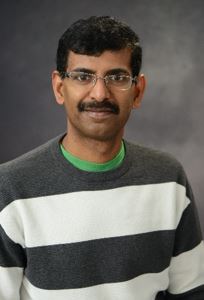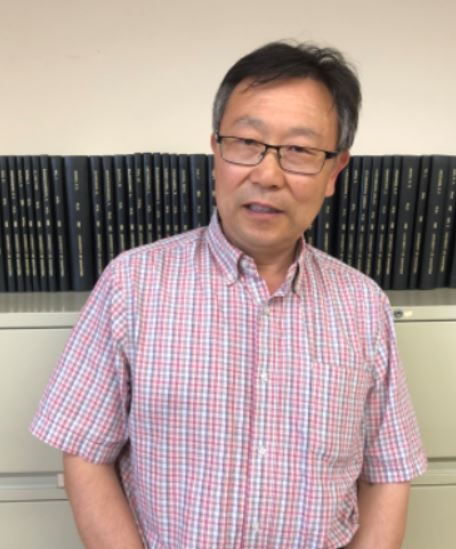John Clark Award
This award, in memory of John Clark, is given annually to the CSBE/SCGAB member who, in the opinion of the Awards Committee, has produced outstanding work in industry, teaching, research, or extension in one or more of the fields of food engineering, or related industry. The award recipient is selected from nominations from at least three members of CSBE/SCGAB and must have been a member of the Society for at five years.
Ce prix, désigné à la mémoire de Monsieur John Clark, est décerné chaque année à un membre qui s'est distingué dans le domaine du génie alimentaire ou dans une industrie connexe par l'enseignement, la recherche, la vulgarisation ou le travail en industrie. Le récipiendaire du prix John-Clark est choisi parmi les candidats mis en nomination par trois membres et est membre de la SCGAB/CSBE depuis au moins cinq ans.
Nomination Form
2021 John Clark Award

Akinbode Adedeji, PhD is nominated for the 2021 John Clark Award in recognition of his dedicated contributions to engineering for agricultural, food and biological systems with a specific focus on Food Engineering as well as his outstanding service to CSBE/SCGAB and ASABE through his editorial and leadership activities. Akinbode is originally from Ibadan, Oyo State, Nigeria, graduated as a Bachelor of Technology in Food Engineering from Ladoke Akintola University of Technology, Ogbomoso, Nigeria and began his graduate studies in food technology at the University of Ibadan, Nigeria. He obtained a PhD in Bioresource Engineering from McGill University in 2010 with his thesis focusing on the various physical properties and engineering characteristics of the most commonly consumed kids favorite - chicken nuggets. In 2014, Dr. Adedeji joined University of Kentucky as an assistant professor of food engineering. His research interests have been focused on food engineering for increasing the use of underutilized grain value-addition (physicochemical characterization, baking quality, and extrusion process development), bourbon waste conversion to value-added products (high fiber source; protein extraction), abiotic stress effect on functionality change in food macromolecules and bioactive compound accumulation, non-invasive characterization of foods using hyperspectral imaging and acoustic emission –machine learning approach, and non-thermal processing (pulsed UV light, ultrasonication) of food.
2020 John Clark Award

Dr. Manick Annamalai obtained bachelors (Agricultural Engineering) and masters (Food Process Engineering) from the Tamilnadu Agricultural University (India) and PhD (Biosystems Engineering) from the University of Manitoba. Manick has 20 years of experience in academia and food industries. At present, he is an Associate Professor with the School of Engineering at the University of Guelph.
His research activities are in two main streams: 1. Bio-imaging techniques for food safety and quality 2. Processing and product development for health and wellness (whole grains, pulses, and healthy sugar substitute). He has published 63 articles in peer reviewed journals and 17 book chapters, edited 9 books and presented more than 100 conference papers.
He has secured more than 2 million dollars in research grants as a Principal Applicant and Co-Applicant through 21 projects. He has supervised and graduated 12 postgraduate students as a main supervisor. He currently advises or co-advises 10 PhD students. He has been working continuously to develop novel quality assessment tools for wide range of food industries to improve the profitability and food safety.
Apart from scientific research and development, Manick has the passion to communicate the nutrition knowledge to the community. To promote whole grain consumption, improve their availability, and motivate researchers across the world, he established “Whole Grains Research Foundation” in 2015 as a Founder and President. Using this foundation, he has been organizing whole grain conferences and workshops. As Chairman, so far, he has organized 8 international Conferences/Symposium/Workshop on whole grains.
2019 John Clark Award

Dr. Fuji Jian is a professional engineer and assistant professor in the Department of Biosystems Engineering at the University of Manitoba. Dr. Jian received his Ph.D at the University of Manitoba in 2003, and excellence of his Ph.D. studies was awarded as “Governor General’s Gold Medal for outstanding graduate studies academic achievement in Canada” and the “CSAE/SCGR 2004 Ph.D. Thesis Award”. After working for a grain storage company (OPI System, Calgary, Canada) for 5 years, he returned to academia as an instructor in 2010 and assistant professor in 2015.
Fuji’s research interests are in the area of post-harvest grain quality, stored-product protection and sensor development with the sole purpose to enhance food safety and security. He is the leading authors in 62 of 76 referred journal papers and book chapters, and authorized and co-authorized more than 30 conference papers. These publications covered: 1) mathematical modeling of grain storage ecosystems; 2) insect biology and ecology inside stored grain bulks; 3) sampling inside grain bins; 4) physical property of stored grain bulks; 5) safety storage of grain and monitoring; 6) insect control and pesticide resistance; 7) grain aeration and drying; 8) sensor development; 9) biomass processing; and 10) particle segregation. Fuji published more than 20 mathematical models and his expertise in mathematical modeling and grain storage ecosystem has been instrumental in revitalisation of grain storage monitoring industry.
Fuji has taught Grain Storage/Crop Preservation, Plant and Animal Physiology for Engineers, Unit Operation, Transfer Phenomena, and Modelling and Simulation of Biological Systems. He is currently supervising/co-supervising 8 M.Sc/PhD students. His group pioneered the study on the use of steam to control insects in stored grain, application of compact microwave device for monitoring insects inside grain bulks, stored-product insect density estimation by using electronic traps, identification of stored grain insects using image restoration classifier neural network, and particle segregation during grain loading and unloading. Dr. Jian is a worthy recipient of the John Clark Award.
2018 John Clark Award

Oon-Doo Baik is a Professor at the Department of Chemical and Biological Engineering at the University of Saskatchewan. Oon-Doo has taught Modeling of Food Processes, Modeling in Biosystems, Transport Processes, and Food and Bioproducts Engineering, courses needed in the understanding of unit operations during food and bioproduct processing. His research has been on the use of electro-technologies for food processing and storage applications, heat and mass transfer processes, extraction of bio-components and biomass processing. Oon-Doo’s research group reported inherent non-uniform temperature distributions during RF heating based on theoretical and experimental determination. Through 3-D multi-physics simulations, his group also determined the magnitude of selective heating during RF assisted disinfestation to kill insect pests without significant damaging grain qualities. They also suggested a new concept of applicator for inline RF disinfestation. Oon-Doo has been active in attracting funding for his research for a total amount of $ 2.3 M over his tenure at the University of Saskatchewan. He has co-authored 60 peer-reviewed journal articles, and 53 conference presentations. He has made 27 invited presentations in different conferences on such as seafood processing, modeling and simulation of processing operations, radio frequency applications in food processing and extraction of bio-active compounds.
2017 John Clark Award
 Dr. Jitendra Paliwal received bachelors in Agricultural Engineering from G.B. Pant University (India) in 1994 and then M.Sc. (1997) and Ph.D. (2002) degrees in Biosystems Engineering both from the University of Manitoba. He is now a Professor with the Department of Biosystems Engineering at the University of Manitoba where he leads the imaging and spectroscopy research in the grain storage area. His work in developing hardware and software solutions is widely referred to by the designers of grain quality monitoring and assessment instruments. He teaches graduate and undergraduate courses in the area of instrumentation, digital imaging, vibrational spectroscopy, and technical communication.
Dr. Jitendra Paliwal received bachelors in Agricultural Engineering from G.B. Pant University (India) in 1994 and then M.Sc. (1997) and Ph.D. (2002) degrees in Biosystems Engineering both from the University of Manitoba. He is now a Professor with the Department of Biosystems Engineering at the University of Manitoba where he leads the imaging and spectroscopy research in the grain storage area. His work in developing hardware and software solutions is widely referred to by the designers of grain quality monitoring and assessment instruments. He teaches graduate and undergraduate courses in the area of instrumentation, digital imaging, vibrational spectroscopy, and technical communication.
Growing up as a child in India, Jitendra Paliwal wondered if it would ever be possible to tell how sweet an apple is without actually taking a bite out of it. Now as a professor with expertise in the area of machine vision and vibrational spectroscopy, he researches ways to peek inside biological tissues and cells – so we can assess much more than just the sweetness of a fruit. Jitendra joined the University of Manitoba as a graduate student in 1995 and continued on as a faculty after completing his PhD in 2002. He is a Professional Engineer registered in Manitoba. Jitendra's research is geared towards providing an abundant supply of safe and healthy food to human beings and livestock while keeping the carbon footprint to a minimum. The tools he uses include spectroscopy, imaging, chemometrics, and artificial neural networks.
Jitendra has contributed to the training of over 60 highly qualified personnel. His research work, so far, has resulted in over 60 scientific papers in international peer-reviewed journals. He has also authored or co-authored 65 conference papers and five book chapters. He is routinely invited at national and international events to talk about the current scientific advancements in the area of post-harvest storage of grain.
Jitendra is a member of CSBE/ASABE since 1996 and has served as an Associate Editor of Canadian Biosystems Engineering. He is also a registered member of Engineers Geoscientists of Manitoba (formerly APEGM) and is the current Chair of its Experience Review Committee. His contribution to the profession of engineering was recognized last year when he was appointed as a Fellow of Engineers Canada. Dr. Jitendra Paliwal is a worthy recipient for the 2017 CSBE|SCGAB John Clark Award.
Jitendra attributes the success of his research program to some very bright students and scholars that he has been fortunate to work with as well as his peers who he routinely collaborates with. With his students and research partners, he has published over 50 peered review articles in scientific journals. In 2012, Jitendra received the CSBE Young Engineer Award for his outstanding contribution to Biosystems Engineering. Jitendra is an exceptional professor, possessing the ability to both lead by example through his hard work and to promote the professional growth of others through timely assistance.
En grandissant en Inde, Jitendra Paliwal se demandait s'il serait possible de dire à quel point une pomme est sucrée sans mordre dedans. Maintenant, en tant que professeur possédant une expertise dans le domaine de la vision par ordinateur et de la spectroscopie vibratoire, il recherche des façons de voir à l'intérieur des tissus et des cellules, afin d'évaluer beaucoup plus que la douceur d'un fruit. Jitendra est entré à l'Université du Manitoba en tant qu'étudiant diplômé en 1995 et a continué sa carrière en tant que professeur après avoir complété son doctorat en 2002. Il est ingénieur agréé au Manitoba. La recherche de Jitendra vise à fournir un approvisionnement sûr et abondant de nourriture saine aux êtres humains et au bétail tout en minimisant l'empreinte de carbone. Les outils qu'il utilise comprennent la spectroscopie, l'imagerie, la chimiométrie et les réseaux neuronaux artificiels. Jitendra attribue le succès de son programme de recherche à ses étudiants et chercheurs avec lesquels il a eu la chance de travailler, et à ses pairs avec lesquels il collabore régulièrement. Avec l’aide de ses étudiants et de ses partenaires, ces travaux de recherche ont permis la réalisation d'une cinquantaine d'articles évalués par des pairs et publiés dans les revues scientifiques. En 2012, Jitendra a reçu le prix du ‘Jeune Ingénieur’ de la CSBE/SCGAB pour sa contribution exceptionnelle au génie des biosystèmes. Jitendra est un professeur exceptionnel qui possédant à la fois la capacité de mener par l'exemple de son travail et de promouvoir la croissance professionnelle des gens avec qui il travaille.

